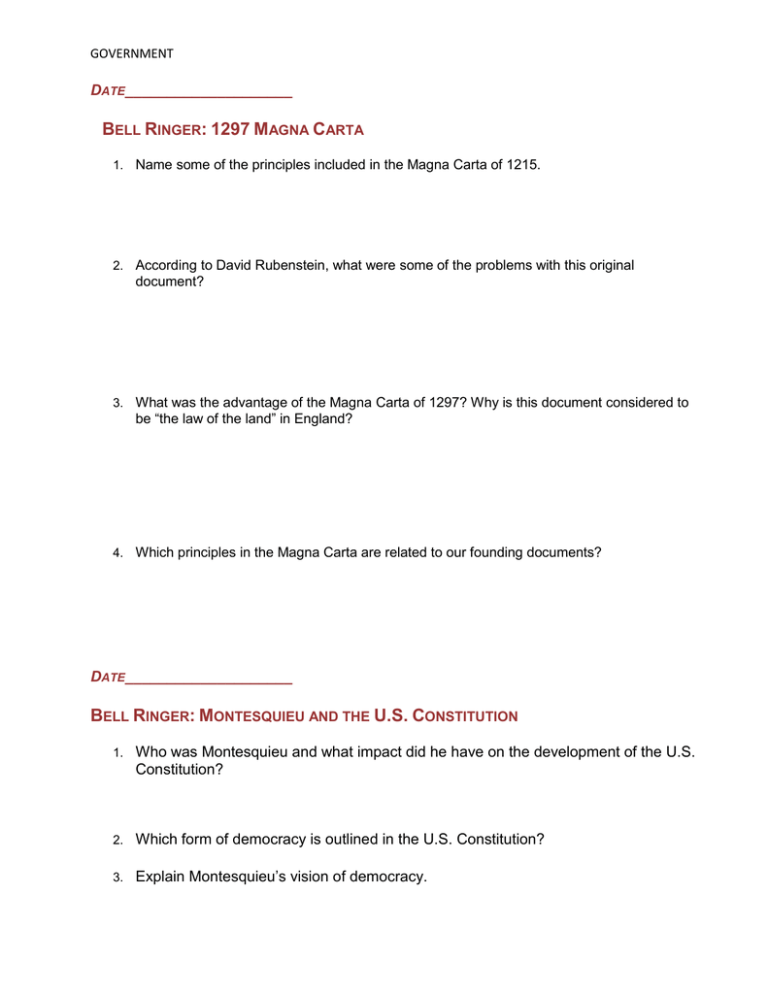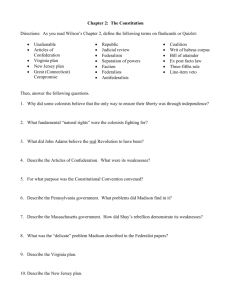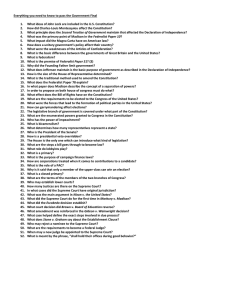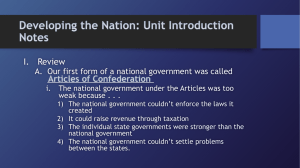Bell Ringer: US Constitution Vignette
advertisement

GOVERNMENT DATE____________________ BELL RINGER: 1297 MAGNA CARTA 1. Name some of the principles included in the Magna Carta of 1215. 2. According to David Rubenstein, what were some of the problems with this original document? 3. What was the advantage of the Magna Carta of 1297? Why is this document considered to be “the law of the land” in England? 4. Which principles in the Magna Carta are related to our founding documents? DATE____________________ BELL RINGER: MONTESQUIEU AND THE U.S. CONSTITUTION 1. Who was Montesquieu and what impact did he have on the development of the U.S. Constitution? 2. Which form of democracy is outlined in the U.S. Constitution? 3. Explain Montesquieu’s vision of democracy. GOVERNMENT 4. How did the framers of the Constitution like James Madison, go “beyond Montesquieu?” 5. According to Mr. Oreskes, why did Madison believe including a Bill of Rights in the Constitution was unnecessary? 6. After the framers completed the Constitution in 1787, how did people react to the document? 7. What did Madison and the other framers do in response? DATE____________________ BELL RINGER: HAMILTONIANISM VERSUS JEFFERSONIANISM 1. Contrast Alexander Hamilton and Thomas Jefferson’s views on the nature of government. 2. To avoid the use of military force, what alternative did Jefferson develop? 3. How do you see this idea practiced today? 4. Why did Jefferson oppose military force? 5. How is “Hamiltonianism” and “Jeffersonianism” evident in current U.S. political parties? GOVERNMENT 6. Summarize Hamilton’s and Jefferson’s view of human nature. With which view do you agree? Explain why. DATE____________________ BELL RINGER: U.S. CONSTITUTION VIGNETTE 1. 2. How many delegates signed the Constitution? Why did the framers feel it was needed? 3. When was the Constitution ratified? 4. Why do you think the framers believed in the separation of powers? 5. How has the Constitution been tested over the years? 6. Why do you think the Bill of Rights was ratified in 1791? 7. In what ways has the Constitution been relevant to you? GOVERNMENT DATE____________________ BELL RINGER: PREAMBLE OF THE CONSTITUTION 1. Read the Preamble of the U.S. Constitution. Define the term "posterity". 2. Why does Mr. McClanahan suggest this as evidence of the founders original intent for the document to be long-lasting? 3. In what way does the amendment process facilitate its longevity? 4. How does the existing Preamble differ from the original draft of the Preamble, first written and presented at the Constitutional Convention in 1787? 5. Who was responsible for changing the wording of the Preamble? 6. According to Mr. McClanahan, why does the Preamble begin with “We the People”? 7. What did James Madison state was the purpose of the Preamble? GOVERNMENT DATE____________________ BELL RINGER: CONSTITUTIONAL INTERPRETATION What are enumerated powers? Which section of the Constitution refers to these powers? Mr. Sagal states that the “age-old question” of Constitutional interpretation is whether the Founding Fathers intended to create a government of very limited powers, applying only to those specific powers that are listed in the Constitution, or whether they intended to create a very powerful government that could do all of those things listed in the Constitution, and more. Which do you agree with? Why? Mr. Sagal states that the U.S. Constitution is the oldest yet shortest written Constitution of any major government in the world, at roughly 4,400 words. According to Mr. Sagal, what are some examples of ambiguous language within the Constitution? Mr. Sagal goes on to say that this ambiguity has contributed to the success of the Constitution as we have “evolved” as a nation. Give an example of how a Constitutional interpretation has changed over time. Give an example of something that you believe should be considered Constitutional or Unconstitutional, and state why. DATE____________________ BELL RINGER: JAMES MADISON AND THE BILL OF RIGHTS According to Ms. Monk, what is the "revolutionary concept" that begins The Bill of Rights? Why was Madison initially opposed to a Bill of Rights? Why does he call it a “Parchment Barrier”? Who and what changed his mind? Did his private sentiments regarding the Bill of Rights differ from the sentiments he shared in his role as an elected official? Define Federalist and Anti-Federalist. Why did the anti-federalists propose a second Constitutional Convention? GOVERNMENT DATE____________________ BELL RINGER: SEPARATION OF POWERS List the three branches of government. As described by Mr. Fisher, and defined in the U.S. Constitution, what power does the Congress have over the President? What power does the President have over Congress? What influence and power do Congress and the President have over the Supreme Court? What power does the Supreme Court have over the President? What power does the Supreme Court have over Congress? According to Mr. Fisher, what are the pros and cons of a government system with Checks and Balances? DATE____________________ BELL RINGER: ORIGINS OF IMPEACHMENT According to Mr. Kyvig, what are the historical origins of impeachment? Why did the British Parliament deem some people too powerful to be tried using normal judicial process? When did America adopt the idea of impeachment? Research and describe our system of impeachment. According to Mr. Kyvig, why is the system of impeachment designed to be "difficult to complete"? What is the role of the Senate during the impeachment process? How did the Framers of the U.S. Constitution ensure that impeachment procedures couldn't be used as a "trivial political tool"? DATE____________________ BELL RINGER: MARBURY V MADISON What was John Marshall’s dilemma when deciding the case of Marbury v Madison? Which precedent was established in Marbury v Madison? How does the decision in Marbury v Madison emphasize the important role of judicial precedent within the legal system? DATE____________________ GOVERNMENT BELL RINGER: THE FEDERALIST PAPERS AND CONSTITUTIONAL PRINCIPLES What do the Federalist Papers explain in relation to the U.S. Constitution? How does Justice Scalia suggest most people would respond to the question, “What makes the United States such a free country?” Why does Justice Scalia disagree with how most people would respond to the previous question? What does he argue is the “real key” to the distinctiveness of the United States? DATE____________________ BELL RINGER: THE ORIGINS OF THE SUPREME COURT Why does Ms. Greenhouse suggest that the Court is the “author of its own story”? Why do we infer that there is supposed to be a Chief Justice of the Supreme Court? Research and define an Appellate Court. What are the typical levels of an Appellate Court system? Which U.S. President later became Chief Justice of the Supreme Court? Which law gave the Supreme Court “discretion over its own docket”? Why does Ms. Greenhouse suggest that this gives justices a “very powerful tool in projecting their own legal agenda”? DATE____________________ BELL RINGER: THE ROLE OF THE COURT UNDER THE CONSTITUTION According to Justice Roberts, how does the appointment of a Justice differ from the election of the President or members of Congress? Why does he suggest that life tenure helps Justices avoid making “political decisions” when hearing cases? Do you agree with life tenure, or do you think that there should be term-limits for Justices? Why? Justice Roberts relates a conflicting difference in his personal opinion about flag desecration with that of his judicial opinion. Does that contrast surprise you? If you were a Justice, do you think that you would able to separate your own personal beliefs from that of your legal opinion? BONUS: Read Article III of the U.S. Constitution which establishes the judicial branch of the federal government. DATE____________________ GOVERNMENT BELL RINGER: SUPREME COURT JUSTICES ON THE RULE OF LAW According to Justice Kennedy, what are the three parts of the concept of "rule of law"? Give an example of a recent event that highlights the importance of the rule of law. How does the rule of law allow for changes in the definition of human rights? What concept does Justice Breyer rank as most important when teaching the Constitution and rule of law? Do you agree? What other concept does Justice Breyer consider vital to the rule of law? Why? DATE____________________ BELL RINGER: WHY TRUST THE SUPREME COURT? What was Federalist 78 about? What was Hamilton addressing in Federalist 78? Which branch has the “power of the purse”? According to Hamilton in Federalist 78, what problem does this pose? Which branch has the “power of the sword”? According to Hamilton in Federalist 78, what problem does this pose? In a brief paragraph describe Alexander Hamilton’s rationale in Federalist 78 for giving an unelected group of officials the authority to check the power of an elected group of officials.






